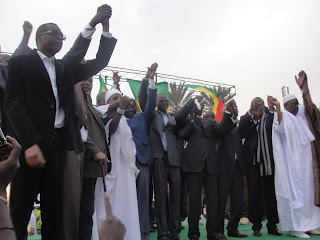It is one of west Africa's more stable democracies, often singled out as an example to its benighted regional rivals. But Senegal is teetering on the edge of the kind of electoral confrontation that has troubled the likes of Ivory Coast and Liberia recently.
In the worst riots in the country for decades, thousands of opposition activists have taken to the streets daily for the past month in protest at a decision by the country's constitutional council to allow the incumbent president, Abdoulaye Wade, to run for a third term in the election this weekend.
The 85-year-old leader came to power in 2000 on a platform of limiting presidents to a maximum of two terms. He even chastised African leaders who stayed in power too long and was loved by many of his people.
Sheriff Bojang Jnr in Dakar
guardian.co.uk, Friday 24 February 2012
In 2001, he delivered on his promise when he effected key constitutional amendments bringing in the two-term rule and cutting the duration of a term from seven years to five.
At a 2007 press conference after he won a second term, Wade said: "In the 2001 constitution I set a limit of two terms. I therefore cannot run for president again in 2012 because the constitution forbids me."
But the veteran leader triggered controversy and tension when he overturned his previous position and announced a bid for a third term. He attributed the U-turn to "the people's hunger for democratic continuity and general satisfaction" over his leadership.
Recent riots have been led mainly by young people dissatisfied with Wade's "illegitimate" bid and with the general affairs of the country. Many of them are unemployed graduates who blame their embattled leader for failing in his promise to create jobs for the youth.
Masamba Thiam, a 2010 graduate of engineering and a regular protester in Dakar, says: "Wade energised us so much when he came to power. We basically stopped attending lectures then just to campaign for him because he promised us that we'll have jobs under his reign and we believed in him.
"But 12 years after, his lies and broken promises have left us with no choice but to fight in the streets for his exit."
Aissatou Seck Thioune was a teenager when Wade came to power. But now she holds a placard at a Dakar protest stating: "My country or my life."
She recalls: "Everybody here was obsessed with Wade when he first came to power. My parents brought his posters home and I attached them all over my room and they told me I didn't have to worry about my future any more because Wade would take care of everything. I was hopeful. But look at the country now. Life is hell for everybody. Time is up – he has to go."
Wade's bigger problem with his people is over his son, Karim Wade, who was born in Paris and has spent most of his life outside Senegal. The president's decision to appoint him as official adviser and give him responsibility for major projects gave rise to suspicion that he plans to create a monarchy.
Opposition supporters have held several street protests against what they see as Wade's plan to hand over power to Karim, described by local media as the minister of sun, sky and everything in between – in reference to his numerous ministerial portfolios. But opponents see him as an alien.
Mademba, a sociologist at a private Dakar university, says: "Karim Wade is technically not a Senegalese. He doesn't speak any of the local languages and he makes no attempt to speak them.
"He started coming to Senegal after his father won the presidency. He doesn't have any Senegalese friends and he doesn't understand our country or our culture."
Latif Coulibaly, Senegal's most prominent investigative journalist, says: "Karim is a Senegalese just by paper. To have him as our president is like having French or Gambian to be our president. Wade's plan will fail."
 |
| opposition united against Wade |
The recent anti-Wade riots have led to the deaths of at least seven people. One of them was 32-year-old Mamadou Diop, a student at Cheikh Anta Diop University. He was reportedly run over by a police vehicle. He was shown on local TV stations leading opposition pre-protest prayers shortly before his death.
Diop's death left his friend Alioune shattered. "It was cowardice … total madness by the police. Mamadou had so much hope of a peaceful regime change this year and he devoted his life and time for this. But now those who hate to see these changes decided to eliminate him. It's unbearable."
The interior minister, Ousmane Ngom, described Diop's death as an accident. But Alioune says: "The minister is a heartless liar who shouldn't be in any public office. I hope he and those directly responsible are tried for this crime."
With the ongoing tensions, many people are questioning the prospect of a credible election this weekend.
Dr Ibrahima Fall, a presidential candidate and former UN assistant secretary general (under Kofi Annan), this week called for a postponement of the election, arguing that "the current situation will not allow a genuine poll".
There are increasing fears that whatever the outcome of the election, the country cannot avoid unrest. As a result, some voters say they will not go out to vote on Sunday for safety reasons.

No comments:
Post a Comment